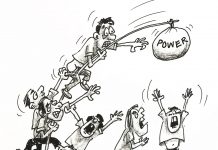In one sad instance, a farmer with his shirt soaked in sweat and disappointment sold a basket of tomatoes for barely the cost of a fast-food meal. It took him months to get those fruits red and ripe. And yet, a middleman with a clean polo and a beat-up calculator decided they were worth just that—a measly few hundred pesos. It’s a common sight, but true. This country has made farming an occupation of quiet despair.
It’s not just the tomatoes. It’s the onions, the garlic, the rice, the corn, the string beans, and the peanuts. It’s the unspoken humiliation of harvesting crops under the sun only to hand them over for a price that can’t even cover half the cost of fertilizer. The middlemen arrive like vultures with clipboards, buying low with the finesse of seasoned gamblers, then selling high to urban markets where housewives unknowingly feed their children food bought at the price of someone else’s misery. In this elaborate play of supply and demand, the farmer is never the hero. He’s the stagehand, forgotten as the curtain falls.
This is why so many of our farmers are giving up—not because they are lazy, not because they don’t love the land, but because the arithmetic of survival simply doesn’t add up anymore. When you spend thousands to grow something only to earn a pittance, how long before common sense overtakes passion? So, they abandon hectares of fertile land, not in protest, but in surrender. They stop planting for the market and plant only for their tables—kamote, kangkong, gabi—enough to keep the children full but never enough to sell. And who could blame them? In this business, the only ones who profit are those who never held a plow.
And so, we import tons and tons of garlic from China, rice from Thailand, and onions from India. It’s a bitter irony, isn’t it? A country with soil so generous and rain so forgiving, yet we can’t even feed ourselves. We sit on a gold mine and beg for copper coins. Each import is a nail in the coffin of our agricultural pride. They say it’s because our products are not competitive, but who made them so? Who allowed this erosion of value at the farm gate? We didn’t need a foreign solution. We needed a local conscience.
What’s worse is that the government knows all of this. The problem has been discussed in Senate hearings, debated in barangay halls, and dissected in university studies. And still, nothing substantial has been done. No laws with teeth, no policies that shield the small farmer from abusive pricing schemes. It’s like watching a man drown while politicians argue about the color of the life jacket. Why aren’t middlemen being regulated? Why aren’t there price floors that guarantee farmers a dignified return? Why must it always be the farmers who take the loss?
The root of the issue lies not in production but in protection. We have always known how to grow things; it’s how to sell them fairly that has remained elusive. And until we fix the links between the field and the fork, farmers will continue to farm in fear—fear of rain, pests, low prices, and worse, of being forgotten. There is no pride in growing food if your own children go hungry. There is no glory in feeding the nation if the nation won’t even lift a finger when you cry foul.
Maybe the farmer’s story doesn’t trend on social media because it lacks spectacle. There’s no drama in brown hands sowing seeds at dawn, no catchy slogan in watching your earnings dissolve at the palengke. But this is the quiet tragedy that eats at the bones of our nation. We talk of food security, yet starve the very people who make that possible. We dream of progress, but allow the engines of that progress to rust in silence.
The government doesn’t need to reinvent the wheel; it just needs to grease the one we already have. Support price mechanisms, co-operative marketing systems, stricter laws against trader manipulation—these aren’t new ideas, they’re just ideas waiting for a spine to implement them. If we can build roads to the farms, we can build systems to protect those who till them. And maybe then, our lowly farmers can come home with more than calluses on their palms and defeat in their pocket.




